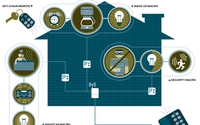Commentary
Taking 'Smart' Out Of Smart Things
- by Chuck Martin , Staff Writer, February 28, 2016
 Most consumers may have an idea of what smart objects
are but that may not be of any help to those trying to sell those smart things.
Most consumers may have an idea of what smart objects
are but that may not be of any help to those trying to sell those smart things.
For example, it turns out that most (91%) consumers are at least aware of the term ‘smart home’ and the majority (51%) see smart homes as one of the most likely technologies to have an impact on consumers lives, based on a recent study.
And when consumers think of smart homes, there’s a range of uses that appeal to them, according to the global smart home study by GfK. Here are the areas that are most appealing to consumers around the concept of smart homes:
- 55% -- Security and control
- 53% -- Energy and lighting
- 48% -- Entertainment and connectivity
- 43% -- Appliances
- 43% -- Health
But it’s not only use of the word smart that may hold consumers back from diving into smart homes, since there are barriers like cost and complexity.
GfK found that about a third (36%) of consumers see high cost being an obstacle. Somewhat ironically, a quarter (25%) of consumers see poor Internet connections as an obstacle to smart home adoption, since an Internet connection is an absolute requirement in The Internet of Things.
Another study found cost to be a factor for even more consumers. That study, based on a survey of 3,000 consumers by Support.com, found that almost a third (31%) of smart home system owners struggle with the complexity of setup, configuration and ongoing support for devices. And those not yet owning any smart home devices see the following as barriers:
- 67% -- High cost
- 43% – Complexity of installing
- 43% -- Would not know which company is responsible for helping them
But one of the biggest barriers may, in fact, may be retailers’ use of the word smart in trying to sell those products.
In a keynote address at a recent conference in Europe, Rudi Aunkofer, GfKs global director for IT, suggested that distributors and sellers should stop using the word ‘smart’ to push products.
He said that sellers and distributors need to be relevant and understand that buzzwords like ‘smart’ have been over saturated and are no longer helping to sell products, as reported in the European trade publication PCR. “Buzzwords like 'smart' aren’t helping anymore,” he said.
While merchants may move away from the term smarts, they aren’t likely to shy away from selling smart products. For example, sales of auto-dosing washing machines that retail for almost three times the cost of conventional machines, are growing more than seven times faster than normal washing machines in Western Europe, based on another GfK study.
Other appliances where the technical features offer consumers relevant befits, like self-cleaning ovens, are growing at twice the rate of regular appliances.
The objects may not be called smart objects by the retailers, but the sellers will still be smart to be selling them.




I would be happy just to interact with people that had any kind of SMARTS, too many people out there living on a smartphone, instead of living LIFE. They can set their thermostat from across town, but can't tell you how many feet in a mile.
Chuck,
You raise a great point about smart things. I never realised that smart things aren't smart; it's the people who work with the information coming from such articles that make them smart, or hopefully do. It's people that make them smart, not the items themselves.
I am so happy you brought up this point; you've inspired me to write a complementary post on the topic - in which I will, of course, make reference to yours.
Well said, Mark.
Glad we could helo, Denyse. Here's another related that may be of some help, based on what you will be posting:
http://www.mediapost.com/publications/article/266753/the-on-off-switches-of-the-internet-of-things.html
Also, Denyse, we do accept guest commentaries for the IoT Daily, so feel free to send to me (Chuck@Mediapost.com) when written and we would be happy to consider it.